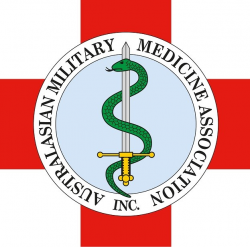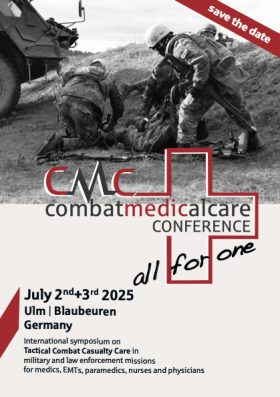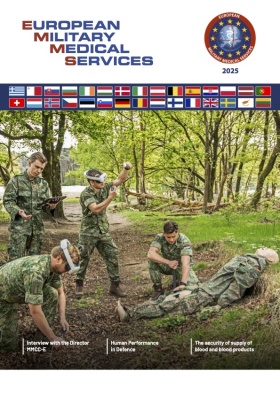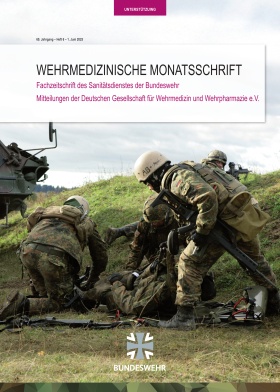
Article: Bernard Phaleg and Frederik Vansina: Official Opening Speech delivered on November 13, 2023 at the 11th DiMiMED International Conference on Disaster and Military Medicine in Düsseldorf, Germany
The Paradigm Shift in Societal Support to Security and Defence
Ladies and gentlemen, good morning.
First of all, I would like to thank DiMiMed for organising this important and urgently needed colloquium. Important because of the valuable, high-class contributions of all speakers and of course the audience. Urgently needed because the actual circumstances force us to shift gears quickly and decisively; for some time now, we have entered a new era that forces us to rethink our security and defence.
“Total Defence”stands out as the most appropriate concept when facing the current threat situation. For those not yet familiar with this concept, you must understand it as a policy combining and extending the concept of military defence and civil defence. It has been adopted by several countries: for example Austria, Denmark, Finland, Norway, Sweden, Lithuania, and Ukraine, in each case with specific modalities of application. In general, it entails a high level of readiness of both the state and its society to defend itself in cases of dangers and catastrophes such as war, crisis, or natural disasters. Total defence represents all activities preparing the society for conflicts. It implies that in a state of war or emergency, all functions of society, both military and civilian, are included in the defence efforts. This means that in the event of a crisis, all social institutions, such as army, police, parliament, government and its agencies, local authorities, the health system, civil society organizations, entrepreneurs, and individuals would all be mobilized to defend the state. Concepts such as resilience, the reserve and civil-military cooperation, are contributing to this overarching concept of “Total Defence”.
Moreover, as the average European’s literacy of strategic security and defence is rather low, it is vital that we start by explaining “why” this matter is so important for our future, our way of living and the values that we hold dear. Only then can we start talking about the “what”, drawing up concepts such as “Total Defence”, fit for purpose and tailored to the countries in Europe, and about the “how”, in order to implement these concepts, turning them into reality.
I believe that this colloquium offers an excellent opportunity to learn from other countries’experience and increase general awareness when it comes to security and defence in our own nations.
Allow me to first develop the most important aspect, the “why”.
For the last forty years, the European continent has enjoyed a unique and stable security environment. We have reinvested this peace dividend in increased social welfare, a secure and democratic society, and almost unlimited access to an abundance of resources, thanks to a free global market economy. Collective Defence was replaced by a focus on collective security in faraway places such as Afghanistan, the Middle East and the Sahel region.
Unfortunately, this era has come to an end with the invasion of Crimea by Russia in 2014, forcing Europe back to a focus on collective defence; this was exacerbated with the unlawful invasion of Ukraine last year. We should remember that it is great power competition that now shapes the world; this was the case in the past – lest we not forget – and it is obviously the case today and it might be even more so tomorrow.
Why is this important?
Because we need to protect our homeland and our open economy from disruption. Because, as small countries, we cannot isolate ourselves from the rest of the world, nor should we be disloyal to our friends and allies.Because we need to make our countries ready to face uncertain futures.
Indeed, we need to prepare ourselves. As mentioned in Article 3 of the North Atlantic Treaty, we need the capacity to resist armed attack. However, we need to keep in mind that prevention and deterrence are always better and cheaper than having to react to unprepared situations. We need to avoid conflict, as conflict generates economic drawback and competition for scarce resources. In fact, peace is a prerequisite for economic growth, whilst war does exactly the opposite.
Moreover, we need to be predictable towards our allies. As we have opted to organise our security and defence collectively, through NATO and the EU, we are not to set ourselves apart from our allies when the going gets rough. Loyalty is of the utmost importance in difficult times, especially for a country that is hosting the headquarters of both organisations.
Furthermore, we can qualify the future as being uncertain: opponents are becoming unpredictable and irrational, first and foremost the Russian Federation; China’s instruments of power are increasing significantly; weaponisation of information is a reality; and demography turns out to be a huge challenge, especially on the African continent. These factors are exacerbated by the effects of climate change, difficulties in accessing vital resources and the substantial amount of refugees, seeking a better life in the West.
Finally, we have to face the fact that the transition from a peacetime economy to facing crisis – or even war – is inherently complex and takes much more time in the Western world than elsewhere. We are in the midst of all this and that is why I dare say that we are looking at an uncertain future.
Looking at the “why”, we first need to understand what future environments could lay in wait for our continent. The “Strategic Foresight Analysis” process which we pursue in a national and NATO context, sheds some light on this. Unexpected events, “strategic shocks”, but also emerging and disruptive technologies all can easily throw a spanner in the works.
The analysis shows a fragmented and competitive environment. Hence, we cannot aim for a sustainable future without strong reinforced societal support and contribution to security and defence matters. Beyond a whole-of-government approach, our society itself is to withstand aggression; we all have the moral duty of contributing to collective defence and security, citizens and military personnel alike. In order to protect the next generation’s future, we need to strengthen our collective defence, deterrence and credibility. The European armed forces are to become more robust and agile, and more resilient and sustainable. Our future information-driven forces are to match the priority capabilities, identified by the EU and NATO, and are to be generated in close cooperation with the industry. The Belgian Defence staff is currently analysing the necessary means and tools, adopting a coherent and comprehensive approach in relation with the Strategic Foresight Analysis.
However, will this be enough to protect our society?
In order to mitigate this uncertainty, I would advocate for a regular implementation of net assessments to capture the dynamics of national or coalition military strengths and weaknesses for com- parison with the capabilities of competitors and adversaries. Indeed, such net assessments will offer critical insights to senior leaders on the relative military power over time. The purpose of net assessments is to help senior decision makers break through the fog of uncertainty that can paralyse decisions on defence investments in order to allocate scarce resources where they have the biggest payoff.
I think we can all agree on the fact that we currently live in turbulent times, war is back at our European doorstep and parts of the world either are on fire or smouldering.
A forward-looking analysis of the consequences of this war provide additional points of attention, in particular: food, energy and raw material security; dependencies regarding oil and gas supply; ammunition stocks and the inability of our industrial base to replenish them in a timely fashion; and, the importance of cohesion, standing shoulder to shoulder with partner nations.
Quoting the Danish Chief of Defence, General Flemming Lentfer; “we need to make the transition from a defence organisation, focused on expeditionary action – “wars of choice” – to a military robust force, focused on dissuasion and conventional warfare – “wars of necessity”. Obviously, such a transition has huge consequences for the armed forces, on all fronts, in all branches and for every aspect of the military. Much has been said, discussed and written about all these challenges and how to deal with them. However, now is the time to put these concepts to good use, the written word needs to become a reality; we need to act now and no longer discuss and debate.
In 2022, more guidance in security and defence became available through the publication of two strategic framework documents: the NATO Strategic Concept 2022 (29 June 2022) and the EU Strategic Compass (21 March 2022).
Moreover, participation in collective deterrence and defence is much more than a mere military responsibility. It implies a coordinated employment of all state instruments of power, a correct and equitable sharing of risks and burdens, and attention to strategic autonomy and resilience. Furthermore, our National Security Strategy states that the strategic autonomy and resilience should be systematically and coherently integrated into national plans and actions: substantiating the EU’s objectives on resilience, with a focus on countering hybrid and cyber threats; increasing societal resilience; and, meeting the aspirations of NATO that considers resilience a matter of national responsibility, both military and civilian.
In Scandinavian countries, in particular in Finland, the concept of “Total Defence” is based on the existence of conscription, the engine of the system that generates a large social influx of people with safety skills. These conscripts also make up a very large reserve force that ensures high social resilience through extensive training that is broader than just defence tasks. In a “Total Defence” approach, reservists not only perform military tasks but are also called upon for tasks in the local security structures.
I would now like to take a closer look at the following four topics.
“Total Defence”
I do realise that the transformation of Defence already includes considerably enhanced societal engagement. Indeed, in Belgium, our STAR plan places enhanced focus on “support to the nation”, whilst the Defence Industrial and Research Strategy is another important contributor. In the – not so distant – future, a “Total Defence” or similar approach will likely be indispensable, both from a societal and defence perspective. This is because the risks, requirements and expectations to support the nation, collective defence, collective security and homeland security will likely coexist and co-occur. Of particular importance is that simultaneous defence contributions need to be anticipated in view of resource constraints across all levels of government. Such an approach will force the national Defences to consolidate their efforts, with other instruments of power reinforcing these military contributions to “Total Defence”. For this to happen, governmental organisations in other sectors of society will have to step up their game. Even more important for “Total Defence” to be successful is the unconditional involvement of the nation and a correct threat awareness among the population. This needs to be explained.
Resilience
Societal resilience is – in part – based on the armed forces, meaning Defence, in support of our national resilience and public services. Indeed, the armed forces constitute one of the pillars, ensuring continuity of government. Conversely, the level of contribution of our services depends on the extent to which they are embedded in the society they have to defend. Such a high level of integration and preparation requires sufficient stocks, personnel, security of supply and a high-quality command system in order to provide our society with the right and sufficient means to absorb shocks and to respond to emergencies, should they arise. However, the armed forces can only do that much. Indeed, the resilience of a nation depends – to a large extend – on civil preparedness.
Currently, focus on civil preparedness is lacking, although in Belgium, the National Security Strategy points us in the right direction. Like I said, the Belgian population, like most Europeans in the West, is insufficiently “threat-aware”, which brings me back to our first and foremost action to take; explain to the people why the current security situation is worrisome. Finally, prior to making up our national resilience, one is to ensure its own resilience is robust enough to withstand crises. Obviously, this is also true for the armed forces. In Sweden for example, an individual must be able to survive autonomously for 3 days.
The Reserve Force
Robust professional armed forces remain the main political tool in deterrence and defence, in crisis prevention and management, and in cooperative security. However, their size will always be limited, lacking enough surge capability and specialized functions to protect our territory during major crises. Building an operational reserve force, which is equipped and well trained, is an absolute necessity. The first step should be putting the reserve to better use, exploring possibilities of using the reserve force as a vector for partnership with the public and private sectors. Such an approach may result in joint activation and training, and workforce sharing, in particular regarding professions which are in high demand.
Civil-military Cooperation
Such a cooperation is a must for the armed forces, in five different aspects.
A true cooperation with our national industrial base is to be re-instated. State of the art technology is required to be at least one-step ahead of our opponents. For that, we need to make our technological and industrial base more robust. At first, we mainly focused on outsourcing as a cost-cutting measure but it turned out to have its limitations because it is determined by contracts and funding, and so by definition not flexible enough. It also means that expertise has been lost within the national Defenses because the people have forgotten about concepts like REFORGER. This needs to be reinvented in a version 2.0 within the framework of the enablement of the rear area in order to derisk the concept of Reception, Staging & Onward Movement (RSOM). To tighten our links with the national industry, we - as nations - need to focus more on insourcing or derisking. Within that context, we can cite the example of the EU Chips Act (supporting technological capacity building and innovation in the Union) or the insourcing of the mining of critical materials.
Partnering with the Belgian and European scientific potential. We wish to work alongside our own research and development centres, universities and innovation nodes, safeguarding intellectual property and boosting national industry on the inter- national market.
Education and training of the greater majority of our population, protection of critical infrastructure, and medical support in crises are to be a priority. These three areas of concern are to be on top of everyone’s “to do” lists as they are vital when it comes to a nation’s resilience and survival.
Closer cooperation, based on a common operational picture. Exchanging intelligence among different departments is of major importance; we should all sing from the same sheet of music. Indeed, having the same understanding of the threats will greatly facilitate cooperation.
Communication is key. We need to get better at addressing our citizens in a coordinated, comprehensive and holistic way, correctly informing people, convincing them when necessary and ultimately changing mindsets when vital interests and Western values are at stake.
Finally, if you allow me one word of encouragement, it would be that the lack of urgency needs to be further highlighted. The timeframe of 2040, which is often put forward, could be misleading for some stakeholders, giving the impression that we still have lots of time to tackle these security and defence issues. This is not true; we see all neighbouring countries stepping up their efforts, reassessing and evaluating their stance in the very short term. This means that 2040, in rapidly changing times and with a war on the European continent, is not that far away when thinking about a new security approach in Europe.
To conclude, it is clear we have entered a new era and we need to explain why we must re-invest in security and defence. Our European armed forces are to be more robust, matching the priority capabilities as identified by the EU and NATO. This is a crucial part of the solution but does not constitute the solution by itself. Concepts such as “Total Defence”, societal resilience, more civil-military cooperation and an operational reserve have to be addressed as integral parts of that solution, each offering a piece of the puzzle. All Europeans, sharing a common destiny, should be ready to face uncertain futures.
I would like to thank you for attending this colloquium and I wish you a good continuation of this conference.
Authors:
Major general (Air) Bernard Phaleg,
Chief Strategy Officer, Belgian Defence
Lieutenant general (Air) Frederik Vansina,
Vice Chief of Defence, Belgium
The authors can be contacted through the editor-in-chief’s email address:
[email protected]
Date: 07/12/2024
Source: European Military Medical Services 2024











